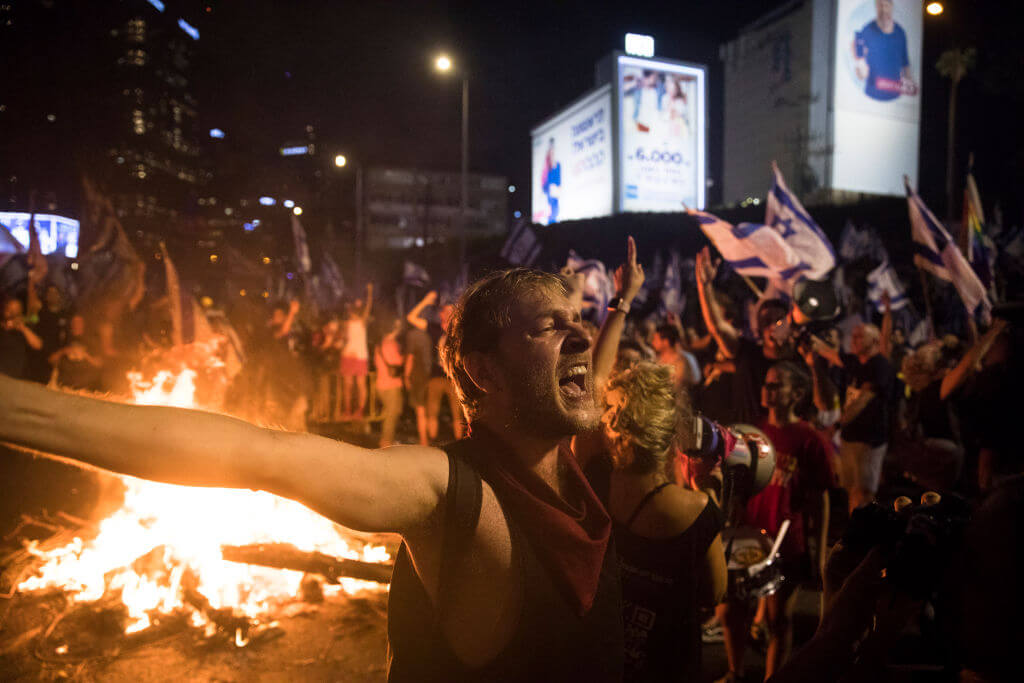Bonfires burn on the highway as Israelis protest removal of Tel Aviv police commander
The protests have intensified as Israel’s parliament has advanced a piece of the judicial overhaul effort

Israelis block a main highway during a demonstration against the Israeli government on July 5, 2023 in Tel Aviv. Photo by Getty Images
TEL AVIV (JTA) — Thousands of people blocked Tel Aviv’s central highway and other major roads in Israel on Wednesday night, as protests surrounding Israel’s proposed judicial overhaul continue to heat up. Some lit bonfires on the road and clashed with police
Dozens of people were arrested in the protests, and police dispersed the demonstrations using mounted officers and water cannons. One man was injured when he was hit by a car that drove through the crowd on the highway. Protests continued Thursday as demonstrators blocked a highway in the coastal city of Binyamina.
The impetus for Wednesday’s protests, which coalesced beginning around 9 p.m. in Tel Aviv, Jerusalem, Haifa and other locations, was the resignation of Amichai Eshed, the Tel Aviv district police commander. Eshed had clashed with Itamar Ben-Gvir, the far-right national security minister, who wanted him to crack down more harshly on the antigovernment protests that have amassed weekly this year in Tel Aviv’s streets. Ben-Gvir had attempted to fire Eshed in March, a decision that was frozen by Israel’s attorney general.
Facing a demotion, Eshed instead quit his post on Wednesday, saying in an address that he was “paying a heavy personal price for my choice to prevent civil war.”
The protests are the latest in six months of demonstrations against the Israeli government’s efforts to strip the Supreme Court of its power and independence. Tens of thousands of Israelis have gathered in the streets to oppose the plan every Saturday night, and this week, the protests have intensified as Israel’s parliament, the Knesset, has advanced a piece of the overhaul effort that would restrict the court’s ability to strike down decisions made by nationally elected officials.
On Monday, thousands of Israelis gathered in the main terminal of Ben-Gurion International Airport, filling the arrivals hall and clogging the roads around the airport. More than 50 people were detained at that demonstration, which had been planned days in advance and took place despite opposition from the Israel Police.
Wednesday’s protest was more spontaneous, with smaller groups of people gathering at night on the thoroughfare that serves as the protests’ usual spot. Larger crowds had come together on ramps that led to the Ayalon Highway, standing atop medians and climbing into the lanes themselves. The crowds were still there around midnight, though they were cleared out soon afterward. Some protesters were sitting in rows on the asphalt and others gathered around a bonfire that crackled into an already hot night. People cheered them on from bridges and balconies surrounding the city’s Azrieli Mall.
Many attendees waved the Israeli flags that have become a symbol of the protests, and wore T-shirts with pro-democracy or antigovernment slogans. One man waved a large flag with the red-and-black logo of anti-fascist groups. It was a smaller version of the protests that erupted in March after Prime Minister Benjamin Netanyahu fired his defense minister for criticizing the judicial reform – a decision Netanyahu later reversed.
“This is a celebration of democracy,” said a woman from Tel Aviv waving an Israeli flag who gave her name as Efrat. The protesters, she said, “care about the state. We want to live, we want a future here.”
In Jerusalem, protesters clashed with police officers in the center of the city as tense, sometimes physical, encounters between protesters and advocates of the reforms dotted the streets in the surrounding neighborhood. One man carrying a handwritten sign reading “End the Tyranny of the Supreme Court” in Hebrew distributed stickers with the same message and received both angry criticism and support from passersby.
Senior Israeli government officials, meanwhile, condemned the protesters as well as Eshed. Amichai Eliyahu, a cabinet minister from the far-right Otzma Yehudit, or Jewish Power, party, referred to the Tel Aviv commander as “pus” in an interview with Israeli media. And Bezalel Smotrich, the far-right finance minister, liked a tweet that showed a video of the car driving through the crowd of protesters, and described it as someone “who insists on his fundamental right to freedom of movement.”
“Responsibility for the chaos on the Ayalon Highway rests with law enforcement and the police, who have lost control against the anarchists who are blocking the Ayalon again and again and again,” Smotrich wrote in a separate tweet, also accusing the police of “selective enforcement” that favors left-wing demonstrators.
Philissa Cramer contributed reporting from Jerusalem.
This article originally appeared on JTA.org.
A message from our CEO & publisher Rachel Fishman Feddersen
I hope you appreciated this article. Before you go, I’d like to ask you to please support the Forward’s award-winning, nonprofit journalism during this critical time.
We’ve set a goal to raise $260,000 by December 31. That’s an ambitious goal, but one that will give us the resources we need to invest in the high quality news, opinion, analysis and cultural coverage that isn’t available anywhere else.
If you feel inspired to make an impact, now is the time to give something back. Join us as a member at your most generous level.
— Rachel Fishman Feddersen, Publisher and CEO